This snapshot provides an overview of the consultation on a container return scheme. The consultation runs from 13 March to 22 May 2022.
Other proposals in the consultation document include improvements to household kerbside recycling and separation of business food waste.
Read the full consultation document and have your say.
Recycling rates in Aotearoa New Zealand are low compared to other countries with better systems, and we have too much litter in our environment.
- Large amounts of recyclable materials are lost to landfill. This results in lost resources and business opportunities.
- We want to reduce waste, litter, and emissions and increase resource recovery and the recycling of materials into new products. Importantly, it needs to be easy for people and businesses to do the right thing.
- We need to transform our systems to build a more circular future where everyone reduces waste, reuses products, and recycles the resources they use.
Many countries have already gone on this journey, and so we have great examples to learn from. That’s why we’re proposing to put the right foundations in place to bring our recycling systems up to global standards, lift the performance of Aotearoa New Zealand’s recycling, and build a low-emissions, low-waste economy.
We are consulting on three proposals related to transforming recycling in New Zealand:
- Part 1: Container Return Scheme
- Part 2: Improvements to household kerbside recycling
- Part 3: Separation of business food waste.
These three proposals are part of a longer-term shift toward a circular economy, where packaging is made of materials that maintain their value, are easy to recycle sustainably and have a low impact on the environment.
The consultation will run from 13 March to 22 May 2022.
This snapshot gives an overview of Part 1: Container Return Scheme.
For more detail, please refer to the full consultation document [PDF, 3 MB].
A container return scheme (CRS) incentivises people to return their empty beverage containers for recycling and/or refilling in exchange for a small refundable deposit.
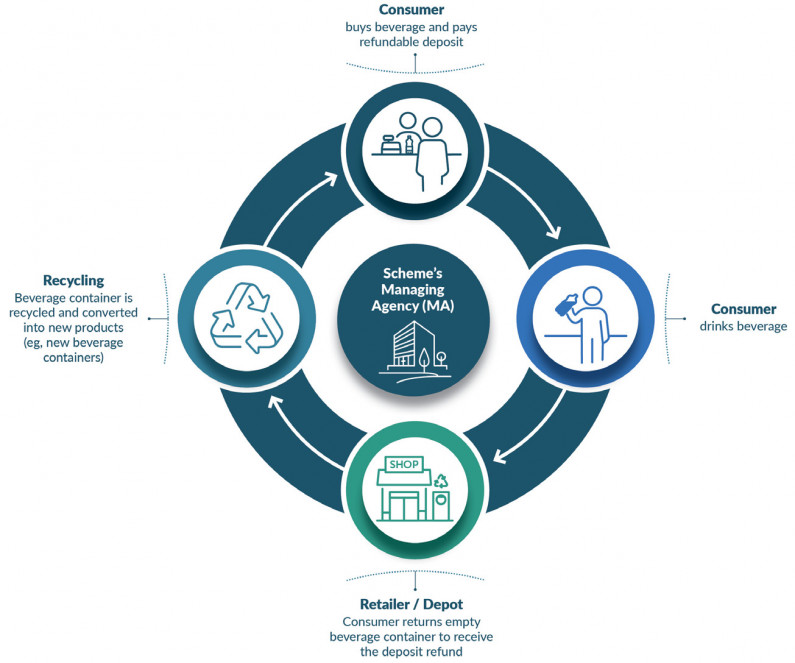
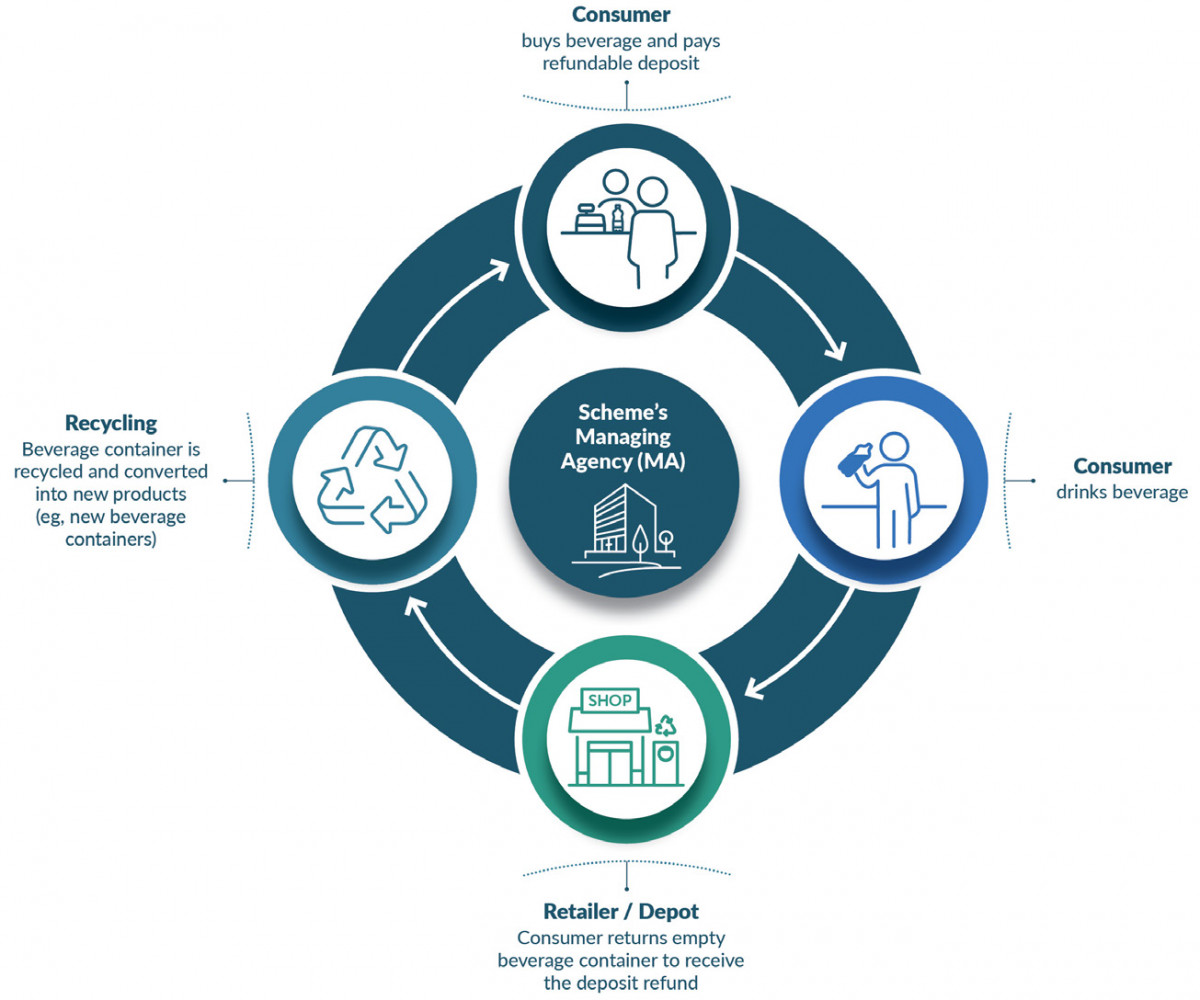
Overseas, container return schemes have successfully reduced beverage container litter and increased recovery and recycling rates. Some schemes, such as South Australia’s, have been operating since the 1970s and continue today. New Zealand also had similar schemes operating until the 1980s, which many people may remember.
Our existing systems don’t incentivise people to recycle beverage containers, particularly away from home (such as, at a park or beach, while at work, traveling or eating out).
New Zealand’s recovery rates of beverage containers are relatively low, particularly when compared to countries overseas that have container return schemes in place.
Each year around 1.7 billion beverage containers are stockpiled, littered* or landfilled in New Zealand.
*National litter data shows that beverage containers make up 66 per cent of recognisable branded litter and 24 per cent of all litter in New Zealand (Keep New Zealand Beautiful National Litter Audit, 2019).
A CRS is complementary to kerbside recycling systems, as it improves recycling outcomes both at and away from home.
The main aim of a CRS is to collect as many beverage containers as possible, so that more containers can be recycled and fewer containers are littered, stockpiled or landfilled.
A NZ CRS could increase beverage container recovery to 85 per cent or higher, which means that the scheme could receive over 2 billion beverage containers annually for recycling. This would see an increase of over 1 billion containers recycled annually.
In considering whether to implement a scheme, we are seeking feedback on what a scheme for New Zealand could look like. Key proposals are summarised below.
Refundable deposit amount
Globally, container return schemes ‘add’ a refundable deposit to the normal price of eligible drinks to incentivise consumers to return their empty drink containers for a refund. The consumer gets their deposit back when they return the empty drink container to a collection point for recycling.
We are proposing that the NZ CRS would apply a 20-cent refundable deposit to all eligible beverage containers within the scheme. The refundable deposit would also attract GST.
Benefits of a 20-cent deposit
- stronger incentive to return the container for the refund, meaning a higher return rate
- reducing beverage container litter, because in addition to recycling their own containers, people are also incentivised and more likely to pick up littered containers for their deposit value
- aligns closely with deposit levels of higher-performing schemes overseas
- enables groups like sports clubs and schools to run litter clean ups and charity drives for containers that deliver greater benefits to their organisation.
Scheme fees
The core costs of a CRS (aside from the refundable deposit) are covered by a nonrefundable scheme fee, which is likely to add another 3–5 cents per container to the refundable deposit.
Scheme fees are a core financial elements of CRS globally. The scheme fees cover the operational costs of a CRS, such as, handling fees (payment for container return point operators per container), transportation costs of the recovered materials, consolidation facility operations, and scheme administration.
While this proposal necessarily assumes 100 per cent pass through of scheme costs to consumers, overseas evidence shows the actual costs passed onto consumers can vary from product to product. Further, upon scheme commencement, many consumers may simply buy slightly fewer beverage containers rather than simply pay more for the same product.
While important, the deposit amount is one factor in the success of a CRS. If the NZ CRS also has a return-to-retail take-back requirement as proposed, we expect a recovery target of 85 per cent by year three and 90 per cent by year five is achievable with a 20-cent deposit amount.
We are also seeking feedback on your preferences for the deposit refund when you recycle. For example, is the refund provided in cash, an electronic funds transfer, vouchers, the option to donate to local community organisations/charities, some or all of these options, etc).
We are proposing to include a broad scope of beverage containers in a NZ CRS, to make it easy and convenient for people to understand and use the scheme.
The size of eligible beverage containers is proposed to be 3 litres and smaller.
Fresh white milk is exempted in all packaging types. This includes cream but not beverages that are long-life or partially dairy/milk-based, (eg, flavoured milk, smoothies, drinkable yoghurt and plant-based milk alternatives.)
This will increase recovery, reduce litter, and ensure a level-playing field for beverage producers.
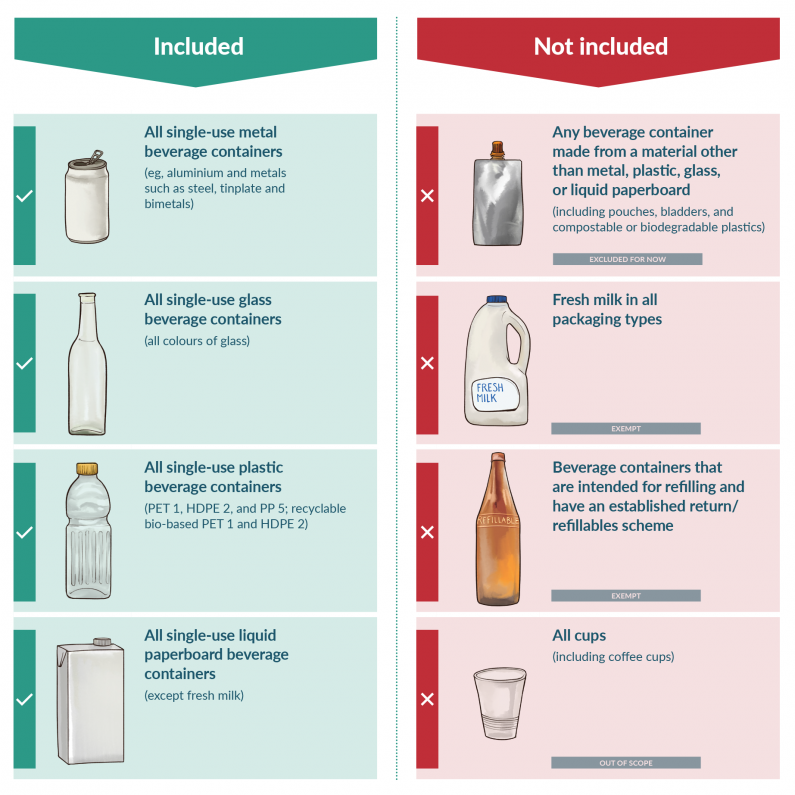
Beverage containers that would be included
- All single-use metal beverage containers (eg, aluminium, steel, tinplate and bimetals).
- All single-use glass beverage containers (all colours of glass).
- All single-use plastic beverage containers (PET 1, HDPE 2 and PP 5; recyclable bio-based PET 1 and HDPE 2).
- All single-use liquid paperboard beverage containers (except fresh milk).
Beverage containers that would not be included
- Any beverage container made from a material other than metal, plastic, glass or liquid paperboard (such as pouches, bladders, and compostable or biodegradable plastics).
- Fresh milk in all packaging types.
- Beverage containers that are intended for refilling and have an established return/refillables scheme.
- All cups (including coffee cups).
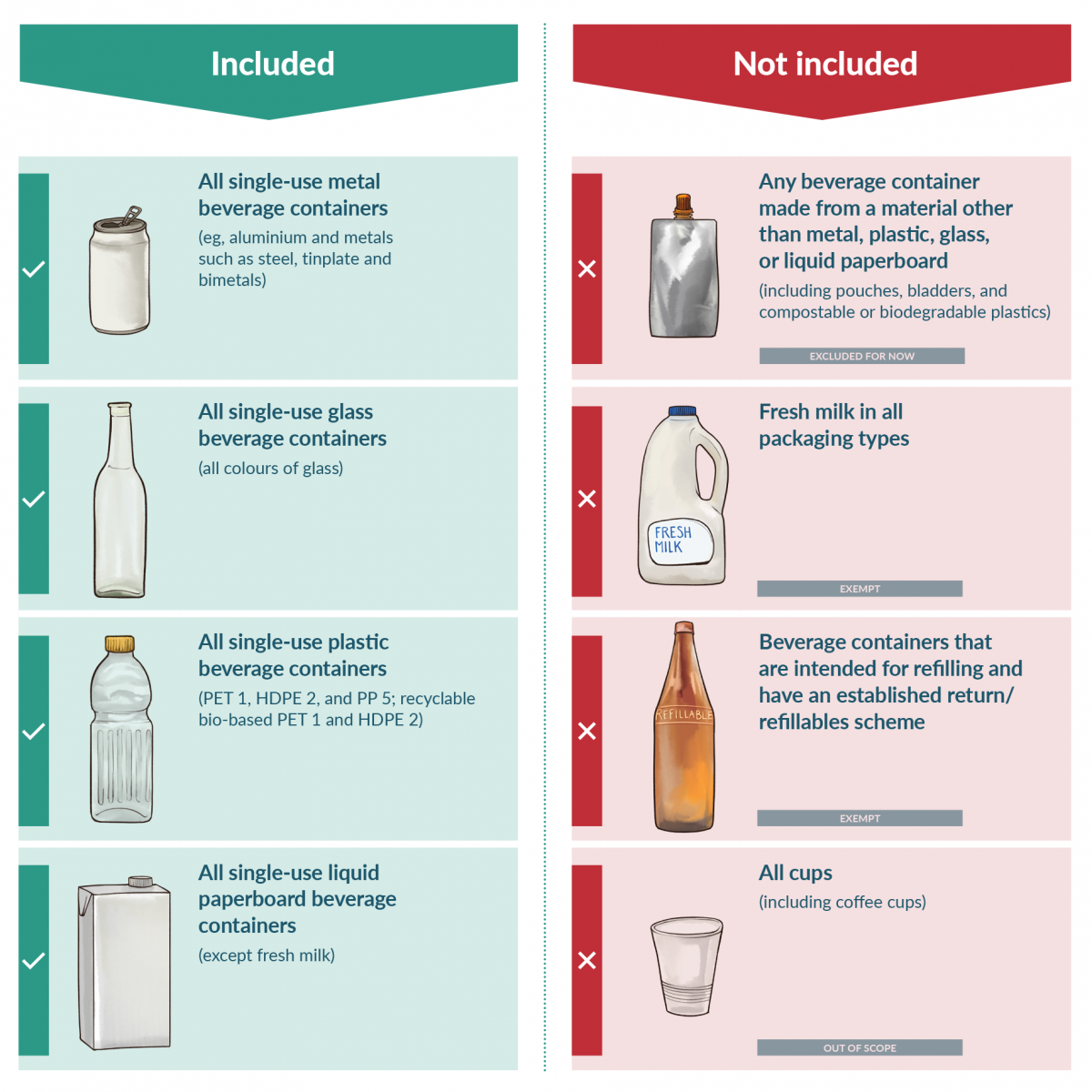
Beverage containers that would be included
- All single-use metal beverage containers (eg, aluminium, steel, tinplate and bimetals).
- All single-use glass beverage containers (all colours of glass).
- All single-use plastic beverage containers (PET 1, HDPE 2 and PP 5; recyclable bio-based PET 1 and HDPE 2).
- All single-use liquid paperboard beverage containers (except fresh milk).
Beverage containers that would not be included
- Any beverage container made from a material other than metal, plastic, glass or liquid paperboard (such as pouches, bladders, and compostable or biodegradable plastics).
- Fresh milk in all packaging types.
- Beverage containers that are intended for refilling and have an established return/refillables scheme.
- All cups (including coffee cups).
Refillable containers
Refillable containers could play an important part in transitioning New Zealand to a low-carbon circular economy, but at this stage refillables are proposed to be exempt from the scheme. We are interested to hear whether you think refillables should be included in a NZ CRS in the future.
It’s essential that it is easy for consumers to return their containers for the deposit refund.
The proposed network would have a mixture of retailer take-back requirements and depot-dropoff options, giving consumers and businesses options for easy recycling. Retailers that sell beverages (such as supermarkets and potentially retailers such as bottle stores, dairies and services stations) could be required to take back empty containers for recycling and provide deposit refunds to consumers. Overseas this is commonly done with reverse vending machines (RVMs).
Retail drop-off locations would provide accessible and convenient container return/refund points at places where people visit already (eg, supermarkets).
The proposed mixed-return model also includes depots for consumers to drop off their containers, as well as for larger commercial volumes of containers, such as from the hospitality sector.
This would provide opportunities for hapū/iwi, recyclers, community organisations, charities, and any entrepreneurial businesses to participate in the network, while also ensuring a high level of convenience via centrally located retail locations.
We are seeking feedback on the level of retail participation in a NZ CRS – in particular, what size and type of retailer should be required to take back eligible beverage containers.
Supermarkets sell the majority of single-use beverage containers in New Zealand, and 95 per cent of New Zealanders live within a 20-minute drive of a supermarket. Retailers, including supermarkets, could take greater responsibility for the products that they sell, by providing convenient drop-off points for consumers across New Zealand.*
*GS1 and PWC estimates for national beverage container sales suggest supermarkets are the primary channel for sales in New Zealand.
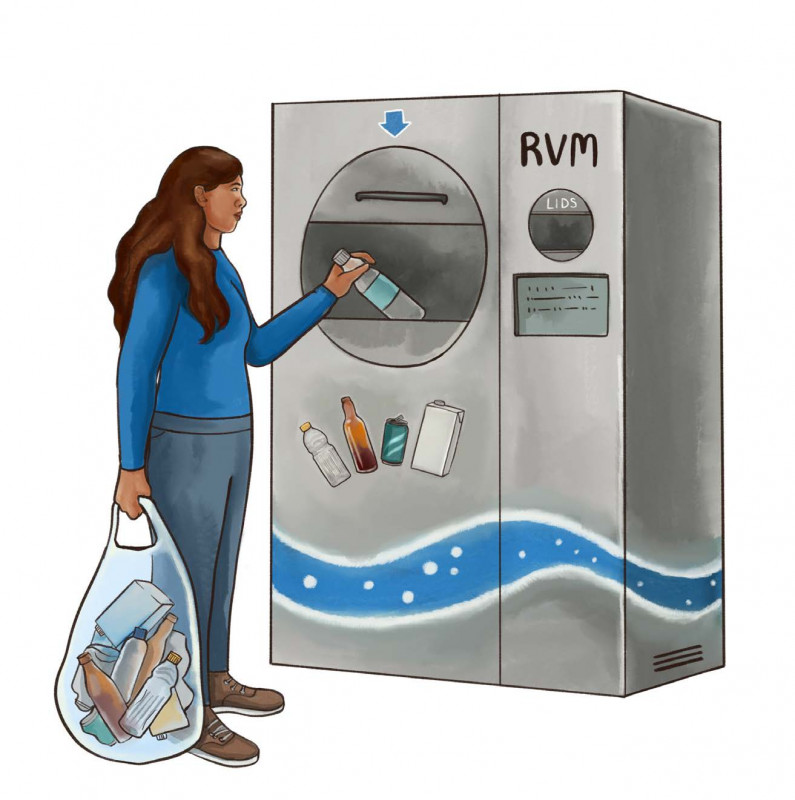
Other considerations
The full consultation document [PDF, 3 MB] gives more detail on considerations such as scheme fees, the deposit financial model, the proposed model for managing and governing the scheme, the network and retail take-back, and recovery targets.
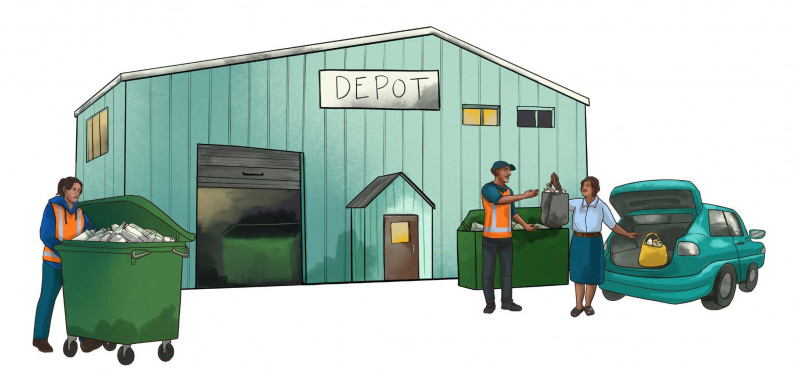
E whāia ana e mātou kia piki ake ai te hangarua i ngā ipu inu, kia whakamimiti i te parahanga me te whakamimiti tukunga hoki.
We’re aiming to increase the recycling of drink containers, reduce litter and reduce emissions.
This consultation sets out issues and options for your feedback on a Container Return Scheme and we invite you to share your ideas. Your feedback will help shape our final proposals.
We are also consulting on improvements to household recycling and the separation of business food waste.
For full details on these proposals, the problems we are trying to solve and the options we have considered, please read the full consultation document.
Fill out the short consultation survey.
You can fill out the long consultation survey through Citizen Space, our consultation hub. PDF files should also be uploaded into Citizen Space. However, scanned documents cannot be submitted.
We request that you don’t mail submissions as this makes analysis more difficult. However, if you need to, please send written submissions to Transforming recycling, Ministry for the Environment, PO Box 10362, Wellington 6143.
If you are emailing your feedback, send it to transformingrecycling@mfe.govt.nz. The question-and-answer format is still required for all long-form submissions, such as PDFs and essay-styled submissions. This makes it clearer which question is being answered.
Submissions close at 11.59pm, 22 May 2022.
The Ministry will analyse and summarise the feedback received and present this to Ministers and Cabinet, to inform decisions on next steps. A summary of submissions will be published on the Ministry’s website. The Government will still need to make a final decision on whether to implement a NZ CRS.
Should the Government decide to proceed with a NZ CRS, there will likely be further consultation at the legislation/regulation development phase. We anticipate a NZ CRS could be operational in New Zealand by 2025.
Kōrero mai ō whakaaro kia whakatikaina tā tātou mahi hangarua, whakamimiti para hoki i Aotearoa!
Have your say to improve the way we recycle and reduce rubbish and litter in Aotearoa New Zealand!
See more on...
Kaupapa Whakahoki Ipu Container Return Scheme: Snapshot of the consultation
March 2022
© Ministry for the Environment